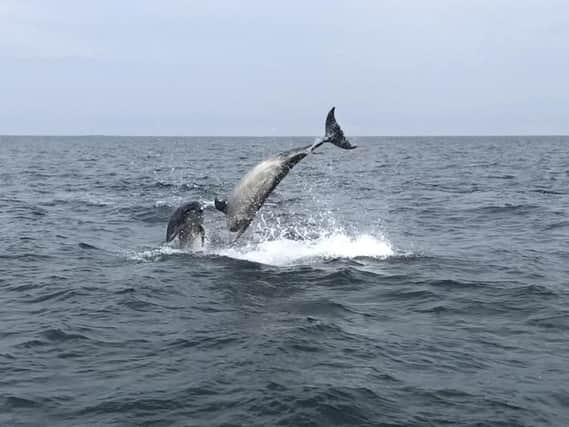Police and marine charity launch bid to reduce public interference of dolphins


Increasing reports of dolphin disturbance incidents in the waters around the UK involving members of the public have prompted marine wildlife charity, Whale and Dolphin Conservation (WDC) to launch a new public information drive in partnership with the UK National Wildlife Crime Unit (NWCU) - a dedicated British police department that gathers intelligence on wildlife crime.
Of particular concern is the lack of awareness of the existing laws around disturbance by members of the public using boats and jet skis, or who attempt to jump in and swim with dolphins in the seas around the UK.
Advertisement
Hide AdAdvertisement
Hide AdThis leads to a worrying lack of reporting of incidents, which are on the increase but thought to be much higher because many boat users and holidaymakers simply do not know what the rules are or how to report incidents they witness.
Surprisingly, the only region where incidences of disturbance are recorded to the appropriate level of detail currently is in Cornwall, where 136 incidences were reported to the Cornwall Marine and Coastal Code Group hotline in 2017. Prosecutions are rare, yet disturbance is a regular occurrence over the summer months when the waters are busy and coastal wildlife is most accessible.
WDC staff and volunteers regularly witness disturbance first-hand and receive many reports from concerned marine wildlife enthusiasts, which has prompted the new awareness drive.
"Our key aim is to stop disturbance before it happens by raising awareness of the issues," said Alice Walters, WDC policy officer.
Advertisement
Hide AdAdvertisement
Hide AdUK seas are a special place for dolphins and whales, being home to 21 species, more than anywhere else in northern Europe. They are also a rapidly growing destination for marine recreation and tourism, which is increasing levels of disturbance.
The coast of Northumberland is a popular place for dolphin-spotting and last year, in particular, there were many sightings throughout the summer.
Disturbance happens when people get too close to marine wildlife, disrupt their natural behaviours and cause them stress.
"Significant human disturbance, or harassment, is illegal and can drive dolphins from the places that are important for them," Alice said. "Everyone is excited to encounter whales and dolphins. Social media interest, particularly around unusual sightings, such as orca, humpbacks and the Thames beluga nicknamed Benny, can draw crowds of people, all hoping to get a close view. They can be unaware of how to behave around them, so most disturbance is unintentional. A good encounter is one that is enjoyable for you and the whales or dolphins."
Advertisement
Hide AdAdvertisement
Hide AdChief Inspector Lou Hubble, from NWCU, said: "Wildlife watching is an amazing experience and it can be very easy to get lost in the moment. If your behaviour has a detrimental effect on a dolphin, you could be committing an offence. Give marine mammals space to exhibit natural behaviour in their natural environment without harassment or disturbance. Keep your distance, show respect and be responsible."